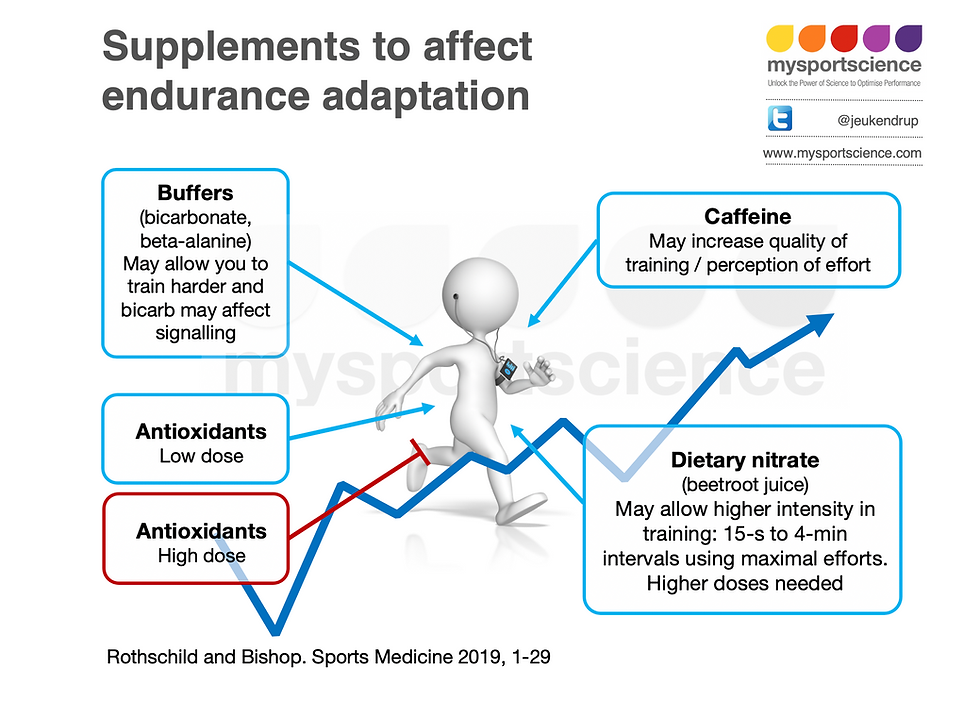Effects of dietary supplements on adaptations to endurance training
- Asker Jeukendrup
- May 3, 2020
- 3 min read

Supplements such as sodium bicarbonate, beta-alanine, beetroot juice, and caffeine have been well-studied in the context of acute endurance performance and typically offer ~1 to 3% improvements in performance across a variety of endurance-related measures. However, although these common supplements also have the potential to modify the adaptive response to endurance training, less is known about how they influence adaptations to training. This was the topic of a recent review looking at the effects of supplements on endurance training adaptations [1].
The ability of a supplement to synergize with endurance training and lead to greater adaptations may be related to several factors, the most important being the ability for an athlete to train harder, thereby increasing the exercise stimulus. Because training, at its core, is the accumulation over time of “adaptation signals” (i.e. molecular responses) following each workout, creating more “signal” during each workout might also lead to greater “adaptation” over time (see recovery versus adaptation).
Buffering agents (sodium bicarbonate and beta-alanine)
In addition to allowing an increased training intensity, supplements that act as pH buffers may also affect the training response by impacting key signaling molecules that are affected by pH [2]. Research using these supplements with endurance training is mixed, either showing additional benefit or no differences between groups. This variation may be due to the use of interval prescriptions that matched exercise intensities (negating one of the primary benefits of taking the supplement) and/or that fall outside of the optimal duration for the supplement to be effective (e.g. < 60 s). The type of training that might benefit most from supplementation are 1–4-min intervals using maximal efforts rather than pre-determined work rates, which should be sufficient to elevate blood lactate and/or pH compared to completing the same workout without supplementation.
Dietary nitrate (beetroot juice)
Dietary nitrate, commonly supplemented and studied in the form of beetroot juice, can augment endurance performance due to its ability to increase plasma levels of nitrite and nitric oxide. Its benefits occur via a number of different mechanisms relating to oxygen efficiency, training intensity, and muscle fibre-type remodeling, and dietary nitrate has the potential to improve adaptations to both high-intensity and endurance-type of training. While the term “dietary nitrate” is often used interchangeably with beetroot juice, nitrates are one part of beetroot juice and studies using beetroot juice often show greater benefits compared with nitrate salts [1]. The type of training that may benefit most from nitrate supplementation would be 15-s to 4-min intervals using maximal efforts rather than pre-determined work rates, similar to the buffering agents. An important consideration is that commercially-available products can vary widely in their nitrate content [3]. No effects of beetroot juice were observed after 6 weeks of training when ingesting ~ 5 mmol nitrate per day, while training studies using 8–13 mmol nitrate per day have shown benefits. (read more on dietary nitrates here).
Antioxidants
Antioxidant supplementation has the potential to both improve performance and recovery as well as impair the adaptive response to training. Adding to the complexity, the term “antioxidant supplement” often includes a variety of substances which may have differing effects inside the body such as vitamin C, vitamin E, resveratrol, and green tea extract. Research has shown that ingesting high doses of vitamins C and/or E can block some of the adaptive responses to training, however studies have rarely found any actual performancedeclines. This disconnect between an impaired adaptive response without changes in performance may suggest that longer time frames are needed before any negative effects of supplementation become meaningful. (read more on antioxidants here).
Caffeine
The most likely way caffeine could improve training adaptations is by allowing an athlete to accumulate a greater training stress, via reduced perception of exertion. Although little research exists looking at continued use on training adaptations, cycling time-trial performance has been improved regardless of habitual caffeine intake, and ingesting caffeine for 3 weeks in a row continued to produce beneficial effects [4]. This supports the idea that regular caffeine consumption during training sessions should not reduce its longer-term impact, but training studies are currently lacking.
Summary
The most important factors affecting the adaptations to endurance training are the training stimuli volume and intensity. However, within a given training program, the appropriate use of dietary supplements may offer additional benefits.
References
1. Rothschild, J.A.; Bishop, D.J. Effects of Dietary Supplements on Adaptations to Endurance Training. Sports Medicine 2019, 1-29.
2. Genders, A.J.; Martin, S.D.; McGee, S.L.; Bishop, D.J. A physiological drop in pH decreases mitochondrial respiration, and HDAC and Akt signaling, in L6 myocytes. Am J Physiol Cell Physiol 2019, 316, C404-C414, doi:10.1152/ajpcell.00214.2018.
3. Gallardo, E.J.; Coggan, A.R. What Is in Your Beet Juice? Nitrate and Nitrite Content of Beet Juice Products Marketed to Athletes. International journal of sport nutrition and exercise metabolism 2019, 29, 345-349.
4. Lara, B.; Ruiz-Moreno, C.; Salinero, J.J.; Del Coso, J. Time course of tolerance to the performance benefits of caffeine. PLoS One 2019, 14, e0210275, doi:10.1371/journal.pone.0210275.





Comments